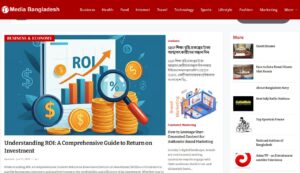Success in professional life doesn’t happen by accident. No matter the industry or career path, excelling in your work requires a mix of technical expertise and essential soft skills. While technical skills may get your foot in the door, soft skills often set you apart and ensure long-term growth and success.
This post explores six essential skills professionals need to master to succeed in their careers. Whether you’re a fresh graduate entering the corporate world or someone looking to advance further, these skills will help you adapt, thrive, and achieve lasting results.
1. Speaking Capability
Effective communication is the backbone of professional success. Whether you’re presenting a groundbreaking idea at a board meeting or simply engaging with team members, how you articulate yourself can leave a lasting impression.
The Importance of Strong Speaking Skills
- Building Relationships: Clear communication fosters trust and understanding, essential for both personal and professional relationships.
- Leadership: Leaders inspire through words. Effective speaking helps share ideas, guide teams, and influence decisions.
- Problem-solving: Articulating issues clearly helps tackle challenges collaboratively and efficiently.
Tips to Improve Speaking Capability
- Practice: Regularly practice your presentations, pitches, or even small conversations in front of a mirror or with a trusted peer.
- Know Your Audience: Tailor your language and tone based on whom you’re speaking to. A technical explanation might work for a specialist audience, but storytelling might better resonate with clients.
- Develop Clarity: Avoid filler words like “um” and “like.” Speak deliberately and pause when needed.
- Public Speaking Courses: Enroll in workshops like Toastmasters to refine your confidence and delivery techniques.
2. Full Confidence in Decision Making
Decision-making is at the heart of professional life, no matter your job title. From small, daily choices to significant strategic calls, the ability to decide with confidence can define your success.
Why Confident Decision-Making Matters
- Efficiency: Indecision can delay outcomes and disrupt workflows. Confident decision-making keeps things moving.
- Credibility: People trust and respect individuals who demonstrate decisiveness, even when decisions carry risks.
- Problem Resolution: Decisions are often made under pressure, and confidence enables you to weigh risks and rewards effectively.
Strategies to Enhance Decision-Making Confidence
- Gather Information: Base your decisions on well-researched data and facts instead of solely relying on instincts.
- Weigh Pros and Cons: List potential outcomes to visualize the best course of action.
- Trust Yourself: Remind yourself of previous decisions that yielded positive results, and use those as inspiration.
- Stay Open to Feedback: Confident decision-makers are also open to refining decisions based on constructive input.
3. Responsibility
Responsibility is more than just meeting deadlines; it’s about owning your role and taking reliability to the next level. Employers value individuals who can take accountability for their work and face challenges head-on.
What Does Responsibility Look Like?
- Accountability: Admitting mistakes and resolving them instead of deflecting blame builds trust.
- Consistency: Reliability is key. Consistently delivering high-quality work establishes your dependability.
- Growth Mindset: Being responsible extends to taking charge of your personal and professional development.
Becoming More Responsible in the Workplace
- Prioritize Tasks: Learn what’s urgent and important. Deliver results when they count the most.
- Face Mistakes Head-On: Mistakes are inevitable, but resolving them rather than ignoring them sets responsible professionals apart.
- Commit to Goals: Go beyond managing daily tasks; commit to larger team or organizational objectives.
- Proactively Seek Feedback: Responsible individuals evaluate themselves regularly and welcome feedback to improve.
4. Positive Attitude
Your attitude can influence not just your personal success but also the morale of those around you. A positive mindset adds energy, drives productivity, and fosters a healthy workplace culture.
Why Positivity is Crucial for Success
- Encourages Collaboration: Positivity fosters teamwork and a problem-solving environment.
- Manages Stress Better: Navigating challenges is more effective when approached with optimism.
- Attracts Opportunities: A positive attitude draws people to your ideas, energy, and leadership.
How to Cultivate a Positive Attitude
- Start with Gratitude: Begin each day by acknowledging what you’re thankful for to set a bright tone.
- Reframe Challenges: Instead of seeing tasks as overwhelming, treat them as opportunities to grow.
- Surround Yourself with Supportive People: Positive colleagues and mentors can uplift your energy when the going gets tough.
- Focus on Solutions: Spend less time dwelling on problems and more time planning actionable fixes.
5. Self-Presentation
First impressions count, and presenting yourself professionally can set the tone for how others perceive you. Everything from your attire to your email etiquette sends subtle cues about your attention to detail and professionalism.
What Does Professional Self-Presentation Entail?
- Appearance: Dressing according to workplace norms conveys respect for the environment and culture.
- Body Language: Maintaining good posture, steady eye contact, and a firm handshake communicates confidence.
- Communication Style: Whether verbal or written, clean, concise, and respectful communication carries weight.
Tips for Mastering Self-Presentation
- Dress the Part: Adapt your attire to fit your company culture or client-facing role. When in doubt, it’s better to be slightly overdressed than underdressed.
- Pay Attention to Non-Verbal Cues: Practice a smile, firm handshakes, and an approachable demeanor.
- Polish Your Elevator Pitch: Be prepared to summarize who you are and what you offer in under 30 seconds.
- Hone Your Email Etiquette: Always proofread your emails before sending and maintain a professional tone.
6. Utilize Your Time Properly
Time is arguably the most valuable resource in professional life. Those who master the art of time management create more opportunities for themselves and stay ahead of the curve.
The Role of Time Management in Success
- Improved Productivity: Time management allows you to complete more in less time.
- Reduced Stress: Prioritizing effectively keeps overwhelming workloads in check.
- Work-Life Balance: Managing time well helps maintain boundaries between work and personal life.
Best Practices for Time Management
- Plan Your Day: Start each morning by listing your goals and organizing them by priority.
- Use Tools: Leverage calendars, project management software, or apps like Trello or Notion to track tasks and deadlines.
- Avoid Multitasking: Focus on one task at a time for better efficiency and accuracy.
- Take Breaks: Step away from your desk to avoid burnout and maintain focus.
Skills Are the Building Blocks of Success
It’s no secret that success in professional life comes down to a combination of determination, expertise, and consistent effort. By improving your speaking abilities, owning your decisions, fostering a sense of responsibility, staying positive, presenting yourself professionally, and managing your time well, you’ll be equipped for whatever challenges your career throws at you.
Start small by picking one skill from the list and working on it daily. Over time, you’ll build a skillset that not only drives success but ensures you stand out in the workplace.
Elevate your career today! Which skill do you want to master first? Share your thoughts below.






